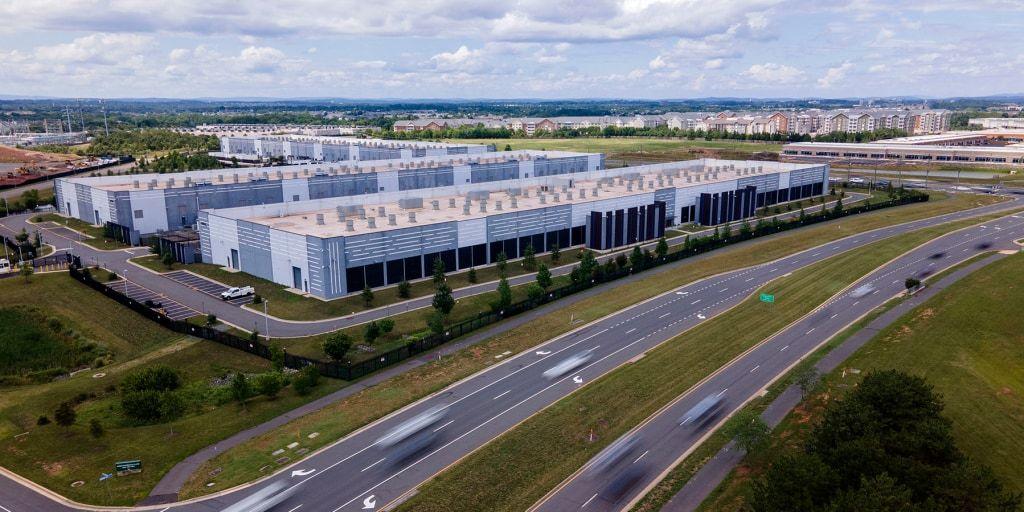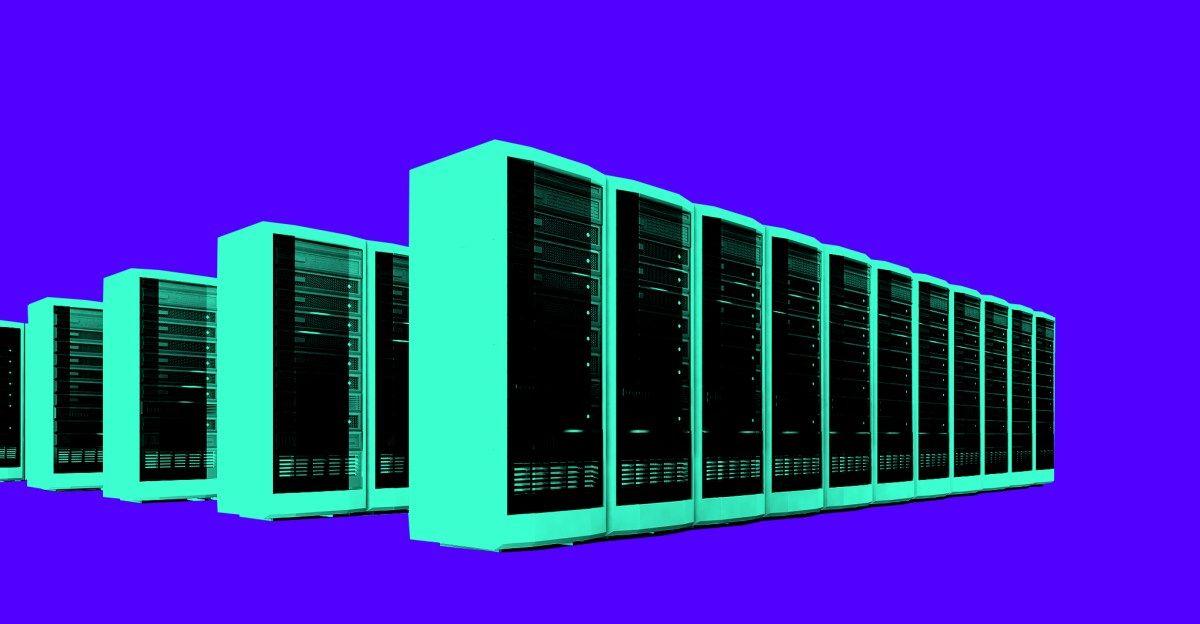Data Centers Spark Political Controversy as Energy Costs Soar
3 Sources
3 Sources
[1]
The Electric Bill is Too Damn High, and Both Sides Agree: It's the Local Data Center's Fault
The data center industry is exploding, and server farms are popping up all over the world. As you might've guessed, much of the industry's boom is built around the blossoming generative AI industry, which requires massive amounts of electricity to do stuff like make a picture of Mickey Mouse committing the 9/11 terrorist attacks. What is also exploding as a result of the tech industry's ever more exponential energy needs are electricity bills -- for everyone. Consumers are noticing (and unhappy about it), and now, so are the politicians tasked with representing them. In some cases, the cost of electricity has increased so significantly that it has presented an easy political platform on which candidates can base their campaigns. Indeed, a recent article from the New York Times shows how the direness of recent utility bills is fueling a gubernatorial race in New England: This generally obscure topic has become critical in New Jersey because electricity rates this summer climbed 22 percent from a year earlier -- faster than all but one state: Maine. As the governor's race has tightened and affordability has become a key issue, power costs have become a predominant theme in ads paid for in part by groups associated with both national parties. One Bloomberg analysis from September found that electricity "now costs as much as 267% more for a single month than it did five years ago in areas located near significant data center activity." But it's not just the people who are unfortunate enough to live close to a data center who are feeling the impact. In August, the New York Times reported that "the average electricity rate for residents has risen more than 30 percent since 2020." Those numbers are expected to continue to explode over the next five years, with one study from Carnegie Mellon University and North Carolina State University estimating that people in the U.S. living near data centers will see another 25 percent increase. The rising costs associated with the data center industry seem to be an ever-more common theme in political races. Semafor quotes several politicians who have recently expressed interest in deterring the data center industry. "I think we should, personally, block all future data centers," said Patrick Harders, a Republican running for an open county board seat in Virginia. "We need to ensure that data centers aren't built where they don't belong," said Geary Higgins, another Republican, in a recent campaign ad. Semafor notes that Higgins' competitor recently did their own ad in which they also dissed data centers, asking: "Do you want more of these in your backyard?" Conservatives have a long history of talking tough when it comes to the tech industry and then doing very little. Democrats, meanwhile, have spent years defending Silicon Valley, despite growing concern from their constituents. However, now that the likes of Elon Musk and Marc Andreessen have thrown their weight behind President Trump, the spell seems to be breaking somewhat. Whether politicians earnestly plan to do anything about the threat to your electricity bill is up for debate. What does seem clear is that the specter of the price hikes has offered an easy way for legislators to virtue signal to their constituents that they're on their side. "Electricity is the new eggs," the New York Times quotes David Springe, executive director of the National Association of State Utility Consumer Advocates, as saying. Damn if that isn't a ringing indictment of the new Trump economy. Electricity is the New Eggs could be a winning campaign slogan for the Democrats, if they were smart.
[2]
Huge AI data centers are turning local elections into fights over the future of energy | Fortune
For the past two decades, data centers were considered some of the most boring infrastructure in tech -- big, boxy buildings that quietly stored and processed information for websites, email, and cloud computing. They rarely drew public attention, much less became a campaign issue. But the explosion of generative AI, and its massive computing needs, has turned what were once modest server farms into sprawling mega-complexes that can take up many millions of square feet, draw enough electricity to power a medium-sized city, and consume millions of gallons of water. Now AI data centers have suddenly become one of the most potent political flashpoints of 2025, igniting fierce debates over power, water, land, and jobs. Critics blame them for rising electricity bills and strained water supplies, while supporters tout their potential to spur economic growth and deliver tax windfalls to long-stagnant communities. Those debates are coming to a head this fall in Virginia and New Jersey -- the only states holding gubernatorial elections this year. The two races offer early test cases for how the politics of AI infrastructure could shape campaigns nationwide in 2026 and beyond. At issue are tax incentives and infrastructure costs states are offering to attract hyperscale AI data centers; mounting concerns about electricity and water use; the limited local jobs such projects deliver compared with their enormous resource demands; and growing scrutiny of Big Tech's political influence -- all against the backdrop of a two-party scramble to control the pace and terms of the AI buildout. In Virginia, Democratic candidate Abigail Spanberger, who is polling as the frontrunner, has made data centers' outsize energy demands a central issue, calling for tech companies to pay a "fair share" for the grid infrastructure their AI operations require. Her Republican opponent, Lt. Gov. Winsome Earle-Sears, supports continued data center growth while blaming Virginia's Democratic leaders for pushing clean energy mandates too quickly, arguing that it's their policies that threaten grid reliability and drive up costs. Similar tensions are playing out in New Jersey, where Democratic candidate Mikie Sherrill backs legislation that would require data centers to help fund grid modernization, while Republican Jack Ciattarelli is focused on attracting more facilities to "supercharge economic growth" and wants to bring new natural gas plants online to meet the soaring demand. But the political calculus is more complicated than a simple left-versus-right divide. As electricity bills climb, candidates are turning their fire on data centers in a rare populist backlash that cuts across party lines. For instance, in Virginia, dueling candidates for a local board of supervisors seat in Prince William County -- Republican Patrick Harders and Democrat George Stewart -- have both called for a ban on new facilities. "I think we should, personally, block all future data centers," Harders said. Stewart agreed, decrying "the crushing and overwhelming weight of data centers" and accusing "massive companies" of forcing residents to "pay for their energy." Even within the GOP, divisions are surfacing. Missouri Republican Senator Josh Hawley publicly clashed this week with his own party's state senate president pro tempore, Cindy O'Laughlin, after she wrote a letter urging him to stop raising questions about data centers and rising electricity rates. "Not a chance," Hawley fired back on X. "These data centers are massive electricity hogs. That's why Silicon Valley wants more transmission lines, solar farms, and windmills. Somebody has to pay for it all -- and don't believe any politician who says it won't ultimately be you." But both parties are also leaning into the data center boom. Some of those who subscribe to the center-left "abundance" agenda (first articulated by journalists Ezra Klein and Derek Thompson) have framed these facilities as essential building blocks of a progressive future built on universal broadband, advanced AI, and a decarbonized grid. The pro-business right, meanwhile, celebrates every new project as proof it can attract investment and fuel economic growth. Meanwhile, the Trump administration has made winning the AI race with China a central priority, and is pushing an AI Action Plan that aims to speed up data center approvals and bolster the grid to meet soaring demand. In an era where investment in AI infrastructure contributes a large and increasing portion of the nation's economic growth, segments of both parties are competing to be the ones showing they can get things built, and quickly -- and to appease the deep-pocketed tech companies that require ever more computing power. This has led to some strange bedfellows. In Pennsylvania, for example, Democratic Governor Josh Shapiro took the stage at an AI summit at Pittsburgh's Carnegie Mellon spearheaded by the state's Republican senator, Dave McCormick, and attended by President Donald Trump. The event came on the heels of Amazon announcing it would invest $20 billion to build data center campuses in Luzerne and Bucks counties. "I can imagine a world where it would be easy for [Shapiro] to just stay neutral," said Joanna Doven, creator of Pennsylvania's AI Strike Team, which aims to make Pittsburgh a global hub for AI innovation and jobs. "But our state hasn't been a high-growth state -- he inherited that -- so we've got to turn the economy back on." AI is here to stay, she emphasized. "And it needs power, it needs data centers. We have all the resources to meet that demand. We need to own the moment." The fraught and politically chaotic debate is unfolding this way because data centers are largely a bottom-up issue, said Megan Mullin, a professor of public policy at UCLA. "Communities across the U.S. vary widely in their ability to absorb new projects, new development, and new construction -- and in their receptivity to it," she told Fortune. "Like with housing development, there are places where it's embraced and others where it's viewed as a threat." When it comes to economic development, AI data centers operate differently from, say, auto plants: For one thing, data centers aren't major long-term job engines once construction ends. The build-out phase can deliver a construction boom -- in Abilene, Texas, for example, several thousand people are working on OpenAI's flagship "Stargate" complex -- but the permanent workforce is expected to be only around 1,700, and it's unclear how many of those jobs will be full-time. At other AI data centers the numbers are even smaller: Meta's $10 billion, 4-million-square-foot facility on a former farm site in Northeast Louisiana, expects to offer only 300-500 permanent jobs after construction. This has raised questions about whether the huge tax incentives and infrastructure investments these sites demand from state and municipal governments (such as power stations, transmission lines, water supply upgrades, and roads) will pay off for local communities. The electricity question in particular has struck a nerve. Grid operators are warning of steep increases in electricity demand for the first time in decades, leading utilities to race to expand capacity by reviving plans for natural-gas plants or building new ones, and, in some regions, even extending the life of deteriorating coal facilities. (The wind and solar industries that had been expected to grow and absorb some of this demand took a heavy blow in the accelerated phase-out of federal tax credits for renewable energy projects in this summer's Republican-backed spending bill.) In Georgia -- one of only about ten states where utility regulators are elected -- two seats on the Public Service Commission (PSC) are on the ballot in November. Democrats Alicia Johnson and Peter Hubbard are challenging incumbent Republicans, and Hubbard has made data centers a campaign issue. "Those data centers are being offered a sweetheart deal of five cents a kilowatt-hour, while you and I, residential customers, pay 21 cents," he said at a recent local forum. "That's why they're coming to Georgia -- because we give them sweetheart deals and tax abatements and other perks. That's costing you. That's why we have to fight at the PSC." If Democrats win, it would break the commission's all-Republican control for the first time in nearly two decades -- and potentially reshape how Georgia regulates power for AI facilities. The politics of data centers are now also weaving into broader campaign strategies, Mullin told Fortune, and the building ambitions of deep-pocketed tech companies are becoming an inevitable factor on both sides of the political aisle. "Candidates are lining up the coalition that they want to bring them into office," she said. That may mean thinking about a cross-partisan challenger down the road, she explained, but right now they are thinking about their primary challenger and how they are going to win their party's nomination. "That's where this becomes really important," she said. In California, for example, Governor Gavin Newsom recently vetoed a bill that would have required data centers to report their projected and annual water usage, saying he was reluctant to impose what he called "rigid reporting requirements" without fully understanding the impact on businesses and consumers. The move was consistent with the anti-red-tape aspects of the "abundance" agenda that Newsom has embraced, but Mullin noted that it may be as much about politics as policy: It also is likely to please California's powerful tech industry. "It's about lining up the endorsers and funders who will put him in a position of strength for whatever he pursues next," she explained. "He is taking steps that make it seem like he's building a coalition, and some segment of tech leaders would be a really critical part of that coalition." Those pressures on the leaders of both parties have been evident since President Trump was elected and began to welcome a parade of tech leaders visiting the White House and Mar a Lago to make the case for AI infrastructure needs -- from Nvidia CEO Jensen Huang to OpenAI CEO Sam Altman. However, those pressures are also being met by another powerful force in some states: growing populist anger from residents -- and voters -- over rising utility bills. In New Jersey, for example, residents have already seen a sudden sharp rise in energy prices caused by the data centers. New Jerseyans' electricity rates rose roughly 20% at the start of June as a result of price-setting capacity auctions -- the market where power producers are paid to guarantee future supply. Power prices soared to new highs on the expectation of data centers' ballooning electricity needs, and are expected to rise again next June. Combined with an intense summer heat wave, the surge caught many residents off guard, said Alex Ambrose, a transportation and climate policy analyst at New Jersey Policy Perspective. "People were not expecting that kind of increase," Ambrose said. "And now they're demanding that lawmakers do something about it." Many residents are also questioning whether building AI data centers aligns with New Jersey's broader land-use goals. One proposed facility in central New Jersey, for example, would be built on farmland, sparking opposition from locals who value the region's green open spaces. The debate echoes the warehouse boom that swept the state during the pandemic, when developers sought to build on preserved land -- but residents say data centers are worse because they create few long-term jobs. And even when these facilities aren't in their backyard, New Jerseyans still feel their impact. Because the state is part of a regional power grid, electricity demand from data centers in neighboring states can drive up utility bills at home. One thing seems inevitable to many: The data centers will be built somewhere, as American tech companies race against each other and China for AI supremacy and the elusive goal of Artificial General Intelligence (AGI) -- AI systems as capable as, or more capable than, humans. State-level proponents say this is the moment to profit from the gold rush. "If we wait for a perfect scenario, the jobs are going to keep getting shipped off to Ohio," said Doven, of Pennsylvania's AI Strike Team. "And I can tell you, sitting here in Pittsburgh -- the Steel City, and the city where we have the world's number one AI school, Carnegie Mellon -- there is something big happening here. One consistent thing that makes no sense is: Where are our data centers?" Whether seen as a generational economic opportunity or a looming crisis, AI data centers are no longer quiet background infrastructure. They're shaping elections, rewiring energy policy, and testing how far communities -- and politicians -- are willing to go to power the next era of technology.
[3]
The sleeper issue that could play a huge role in Virginia and New Jersey -- and the midterms
Residents warn of strain on water supply as AI data hubs bloom out west Leaders in both parties are locked in competition to encourage tech giants to put sprawling data centers in their states, looking for an economic leg up and an innovation edge in the early days of the artificial intelligence boom. Now, those same leaders are dealing with a downside that's more apparent by the month: Those electricity-hungry data centers are a major contributor to rising utility bills for cost-conscious residents who have been concerned about rising prices for years. "Voters are mad as hell about energy prices increasing," Virginia state Del. Shelly Simonds, a Democrat, said. "And they're mad about affordability in general. And anybody who ignores these issues does so at their peril. It's definitely going to be an issue during the midterms." This is becoming clearer in her state -- considered the nation's data center hub -- and New Jersey, which has experienced some of the largest year-over-year electricity bill hikes on a percentage basis. They also happen to be the two states with the biggest elections this fall. Data centers are required to run everything from Uber to Netflix to Amazon. But those required to run artificial intelligence programs demand an outsize amount of power compared with their predecessors: A recent Bloomberg News analysis of electricity prices across the country found that monthly electricity costs have gone up as much as 267% compared with five years ago in locations near substantial data center activity. While the nominees for governor in both states have promised to tackle rising prices, leaders say they have yet to hear much discussion of the data center angle. NBC News spoke with 14 elected officials and stakeholders for this report on how states are handling the data center boom -- and everything that comes with it. "People are now looking at this, going, 'What the hell is going on?'" Virginia state Sen. Richard Stuart, a Republican, said. "And rightly so. And to be honest with you, it should be a big part of the campaign, but I don't know that I'm hearing it." The reality of interconnected, interstate power grids means cost increases can spread across multiple states, regardless of where a data center is located. Last month, Pennsylvania Gov. Josh Shapiro, a Democrat, convened a meeting with leaders from all 13 states served by PJM Interconnection, which operates the electric grid servicing all or parts of those states. Shapiro suggested his state could withdraw from the system, which includes New Jersey, Virginia and Pennsylvania, if PJM didn't do more to control costs for consumers. Elected leaders and PJM have joined to call for speeding up power projects. "The bottom line about electricity prices is that we are facing a situation of demand outpacing supply, causing prices to rise," Daniel Lockwood, a spokesman for PJM, said in a statement. "Demand for electricity is growing, not only in PJM, but across the United States, driven by data centers that power the digital economy and the development of artificial intelligence as well as the electrification of vehicles and building heating systems." Earlier this year, the consulting firm Monitoring Analytics, which provides market analysis for PJM, estimated data centers accounted for 63% of price increases for the coming year. In courting companies like Meta, Microsoft and Oracle to open data centers in their states, officials have offered significant tax breaks and benefits. The companies argue those developments provide huge tax revenue increases for the states and localities that host them, in addition to job growth -- particularly construction jobs to get the data centers off the ground. Their advocates in and out of government say places without data centers will be left behind in the race to break new ground in AI. But many lawmakers who spoke with NBC News said that beyond the additional tax revenue, they weren't seeing many other benefits to their constituents, while those same residents are seeing their utility bills -- and property tax assessments -- rise. "I don't care what anybody says, data centers don't produce jobs," said Stuart, the Republican who has worked on a number of data center-related bills in the Virginia state Senate. Data centers do create property tax and other tax revenue, he noted, "but with that revenue comes a heightened cost to the taxpayers." Virginia state Del. Josh Thomas, a Democrat who has also been involved in numerous data center bills, said he didn't think there were many direct benefits of opening a data center beyond the increased tax revenue.
Share
Share
Copy Link
The rapid expansion of AI-driven data centers is causing a surge in electricity costs, becoming a contentious issue in local and state elections. Politicians from both parties are grappling with the economic benefits and environmental concerns of these facilities.
The Rise of Data Centers and Their Impact on Energy Costs
Driven by the booming AI industry, the rapid expansion of data centers is causing a significant surge in US electricity costs. This infrastructure trend has transformed what was once considered mundane infrastructure into a contentious political issue, especially in states with gubernatorial elections .

Source: NBC
Political Battleground: Virginia and New Jersey
In Virginia and New Jersey, where gubernatorial races are underway, data centers' impact on energy costs is a central campaign issue. Candidates from both parties address voter concerns over rising utility bills, with some demanding tech companies contribute more to grid infrastructure .

Source: Fortune
Cross-Party Concerns and Diverging Solutions
The backlash against data centers cuts across party lines; in Virginia, both Republican and Democratic local candidates have called for new facility bans . Major parties diverge on solutions: Democrats favor tech company contributions to grid modernization and clean energy, while Republicans prioritize economic growth from data centers, often criticizing clean energy mandates as cost drivers .
Economic Benefits vs. Environmental Concerns
The data center debate highlights tension between economic development and environmental sustainability. While offering tax revenue and some jobs, critics argue benefits are outweighed by local resource and infrastructure strain .

Source: Gizmodo
Related Stories
National Implications and Future Outlook
This controversy extends beyond Virginia and New Jersey, with states like Pennsylvania also grappling with data centers' impact on their power grids and economies. The issue will likely be significant in the 2026 midterm elections and beyond .
The AI Race and Its Consequences
The Trump administration's AI Action Plan, aimed at speeding data center approvals and bolstering the grid to win the AI race against China, creates unusual political alliances and forces both parties to reconsider tech infrastructure and energy policy .
As the AI industry grows, the debate over data centers and energy costs will intensify. Politicians and policymakers must balance technological progress with constituent concerns over utility bills and environmental sustainability.
References
Summarized by
Navi
[1]
[2]
Related Stories
Anthropic pledges to cover electricity costs driven by its AI data centers
11 Feb 2026•Business and Economy

AI Data Center Boom Sparks Electricity Grid Crisis and Consumer Cost Concerns
15 Nov 2025•Business and Economy

Senators probe tech giants as AI data centers drive electricity costs up, communities fight back
16 Dec 2025•Policy and Regulation

Recent Highlights
1
Google Gemini 3.1 Pro doubles reasoning score, beats rivals in key AI benchmarks
Technology

2
Meta strikes up to $100 billion AI chips deal with AMD, could acquire 10% stake in chipmaker
Technology

3
Pentagon threatens Anthropic with supply chain risk label over AI safeguards for military use
Policy and Regulation





